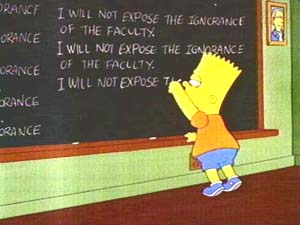In one sense, it’s no surprise. Frustrated not only by the persistence, but by the powerful resurgence of climate denial, many scientists are outraged. Case in point: Two editorials in scientific journals (hat tip to RealClimate) denouncing the “ignorance” we’re now seeing in Washington on this topic.
By far the calmer editorial comes from Nature. It’s a commentary on the House GOP’s bizarre attempt to legislate away the EPA’s endangerment finding (as if you can legislate physics), and Congress’s dismal climate hearings:
Misinformation was presented as fact, truth was twisted and nobody showed any inclination to listen to scientists, let alone learn from them. It has been an embarrassing display, not just for the Republican Party but also for Congress and the US citizens it represents….the [endangerment finding] legislation is fundamentally anti-science, just as the rhetoric that supports it is grounded in wilful ignorance. One lawmaker last week described scientists as “elitist” and “arrogant” creatures who hide behind “discredited” institutions.
Nature’s editorial is titled “Into Ignorance”—a problematic phrase in my opinion (as we’ll see). But in general, I agree with the sentiment expressed in Nature. The way Congress is behaving really is unacceptable.
However, my germ of worry about the Nature editorial grew into an oak when I read an editorial by two scientists in Water, Air, and Soil Pollution entitled “A Vaccine Against Ignorance.” Here, the authors literally say the public doesn’t know what they know and that’s why we have these problems:
Now, some people and special interests continue to propagate misleading information about climate change. They are using all of their newly gained knowledge (on how to fool the public) to enhance their greedy benefits. Once the method of scientific inquiry is understood, and the knowledge of how to evaluate scientific claims is at hand, people are not likely to be swayed or confused by misinformation. Some poorly educated people, on the other hand, will be at the whim of the profiteers, not being able to distinguish a lie from a statement based on scientific data. In fact, the more complex an explanation, the more distasteful it might appear to them. These people do not want to be burdened with factual information that their backgrounds do not prepare them to conceptualize; they want to believe in ideas that require minimal intellectual effort. They are likely to prefer a fairy tale to reality; it’s so much nicer (for a while) to think that no serious problems exist. Such people just continue to live in a fantasy world that will dissolve when reality becomes oppressive, just as does a dream fades away after one wakes. Then it will unfortunately be too late to correct the problems that were propagated by ignorance.
This is stunning, in many, many ways.
First, while the charges of “elitism” aimed at U.S. scientists and intellectuals are usually bogus, it’s hard to claim they are bogus here.
The passage also, ironically, seems very ignorant about how science denial actually works. As anyone who reads DeSmogBlog knows very well, the top climate skeptics are, you know, scientists. They are not ignorant of the scientific method. They may cleverly twist and abuse its findings, perhaps, but they all learned it, and were awarded advanced degrees for doing so. These are not “poorly educated people” we’re dealing with. Not remotely.
And as for the nonscientist citizens who encounter the climate debate, and don’t know what to think? They may be confused, but it doesn’t make them ignorant about the scientific method. They also may be deflated, uncertain about what’s true—because the media is not doing its job of adjudicating.
None of this validates the Water, Air, and Soil Pollution authors’ complaints, however, nor supports their proposed solution—give them more education. Better public science education should be valued for many reasons, but it isn’t going to give us more responsible journalists, or fewer climate deniers.
Fortunately, Nature Climate Change just ran a very important commentary by Baruch Fischoff of Carnegie Mellon and Nick Pidgeon of Cardiff University on what the social and decision sciences teach us about how to deal with the rift over climate change. It places us in a completely different universe from the Water, Air, and Soil Pollution piece.
There’s much to learn from Fischoff and Pidgeon, but one thing they caution against is the so-called “deficit model”:
These research results, and others like them, belie the simple behavioural theory underlying the ‘deficit model’ of the public understanding of science, which assumes that simply teaching more science will bring lay behaviour into line with scientists’ expectations. Although the limits to this model are well documented, it has such strong intuitive appeal that communication must explicitly adopt an alternative strategy if it is to respect audiences’ values, feelings and need for dialogue and engagement.
Yup, that’s right—deficit model thinking about why the public doesn’t accept science flies in the face of, you know, science.
I very much want scientists to succeed in getting the public to accept and embrace their hard won knowledge. But we’re never going to get there if our strategies aren’t also based on the best and most relevant research.
Subscribe to our newsletter
Stay up to date with DeSmog news and alerts






